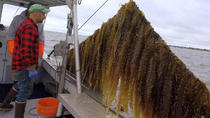Seaweed Farming
Seaweed farming and its surprising benefits
April 29, 2018:
Seaweed may be thought of as a nuisance, but an increasing number of fishermen, scientists and consumers are seeing it as a solution.
Take a look at the 60 minutes story.
Exerpt from the 60 minute story:
How seaweed can save the environment
But at this kelp farm in the waters outside Seattle, producing food is almost beside the point. This is a test farm, where Betsy Peabody of the Puget Sound Restoration Fund and a team of scientists are doing an experiment to see whether seaweed can help fight the growing problem of ocean acidification -- caused mainly by increasing carbon dioxide levels in the seas.
Betsy Peabody: Roughly 25% of CO2 in the atmosphere is being absorbed into oceans.
Lesley Stahl: And that is what we're getting from fossil fuels?
Betsy Peabody: From both carbon emissions, from deforestation, and I think initially people thought, "Well, thank goodness the oceans are taking up some of that carbon dioxide." But then, scientists started to document that, in fact, when that carbon dioxide goes into the ocean, it causes chemical changes.
Changes like increasing the water's acidity, as documented in the U.S. government's 2017 climate science special report. The excess CO2 causes "a decrease of carbonate ions... Which many marine species use to build their shells and skeletons." Worldwide, "ocean surface waters have become 30% more acidic over the last 150 years." And in the Pacific Northwest, the problem is compounded by currents that bring more carbon-rich waters to the surface. And that's where seaweed comes in.
Dr. Charlie Yarish: Kelp take up carbon dioxide like any plant does, and it just so happens it lives in the water. There are winners and losers in ocean acidification. Organisms that produce carbonate shells like shellfish, they're a loser. They can't handle the lower PH. They can't deposit as much calcium in their shells. On the other hand, when seaweeds like kelp, they actually pick up that carbon dioxide because now it's easier for them to do photosynthesis.


